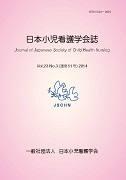Volume 23, Issue 3
Displaying 1-20 of 20 articles from this issue
- |<
- <
- 1
- >
- >|
-
2014 Volume 23 Issue 3 Pages i
Published: 2014
Released on J-STAGE: December 09, 2016
Download PDF (1240K)
Original Article
-
2014 Volume 23 Issue 3 Pages 1-9
Published: 2014
Released on J-STAGE: December 09, 2016
Download PDF (1704K)
Research Reports
-
2014 Volume 23 Issue 3 Pages 10-17
Published: 2014
Released on J-STAGE: December 09, 2016
Download PDF (1283K) -
2014 Volume 23 Issue 3 Pages 18-25
Published: 2014
Released on J-STAGE: December 09, 2016
Download PDF (1311K) -
2014 Volume 23 Issue 3 Pages 26-33
Published: 2014
Released on J-STAGE: December 09, 2016
Download PDF (1409K) -
2014 Volume 23 Issue 3 Pages 34-41
Published: 2014
Released on J-STAGE: December 09, 2016
Download PDF (1552K) -
2014 Volume 23 Issue 3 Pages 42-48
Published: 2014
Released on J-STAGE: December 09, 2016
Download PDF (1311K) -
2014 Volume 23 Issue 3 Pages 49-55
Published: 2014
Released on J-STAGE: December 09, 2016
Download PDF (1283K)
Materials
-
2014 Volume 23 Issue 3 Pages 56-62
Published: 2014
Released on J-STAGE: December 09, 2016
Download PDF (1280K) -
2014 Volume 23 Issue 3 Pages 63-69
Published: 2014
Released on J-STAGE: December 09, 2016
Download PDF (1285K) -
2014 Volume 23 Issue 3 Pages 70-76
Published: 2014
Released on J-STAGE: December 09, 2016
Download PDF (1287K) -
2014 Volume 23 Issue 3 Pages 77-83
Published: 2014
Released on J-STAGE: December 09, 2016
Download PDF (1280K) -
2014 Volume 23 Issue 3 Pages 84-91
Published: 2014
Released on J-STAGE: December 09, 2016
Download PDF (1290K) -
2014 Volume 23 Issue 3 Pages 92-99
Published: 2014
Released on J-STAGE: December 09, 2016
Download PDF (1283K) -
2014 Volume 23 Issue 3 Pages 100-106
Published: 2014
Released on J-STAGE: December 09, 2016
Download PDF (1286K) -
2014 Volume 23 Issue 3 Pages 107-114
Published: 2014
Released on J-STAGE: December 09, 2016
Download PDF (1318K)
Chairperson's Address
-
2014 Volume 23 Issue 3 Pages 115-119
Published: 2014
Released on J-STAGE: December 09, 2016
Download PDF (1155K)
Educational Lecture
-
2014 Volume 23 Issue 3 Pages 120-124
Published: 2014
Released on J-STAGE: December 09, 2016
Download PDF (1153K)
Special Lecture
-
2014 Volume 23 Issue 3 Pages 125-130
Published: 2014
Released on J-STAGE: December 09, 2016
Download PDF (1153K)
Symposium
-
2014 Volume 23 Issue 3 Pages 131-136
Published: 2014
Released on J-STAGE: December 09, 2016
Download PDF (1155K)
- |<
- <
- 1
- >
- >|
